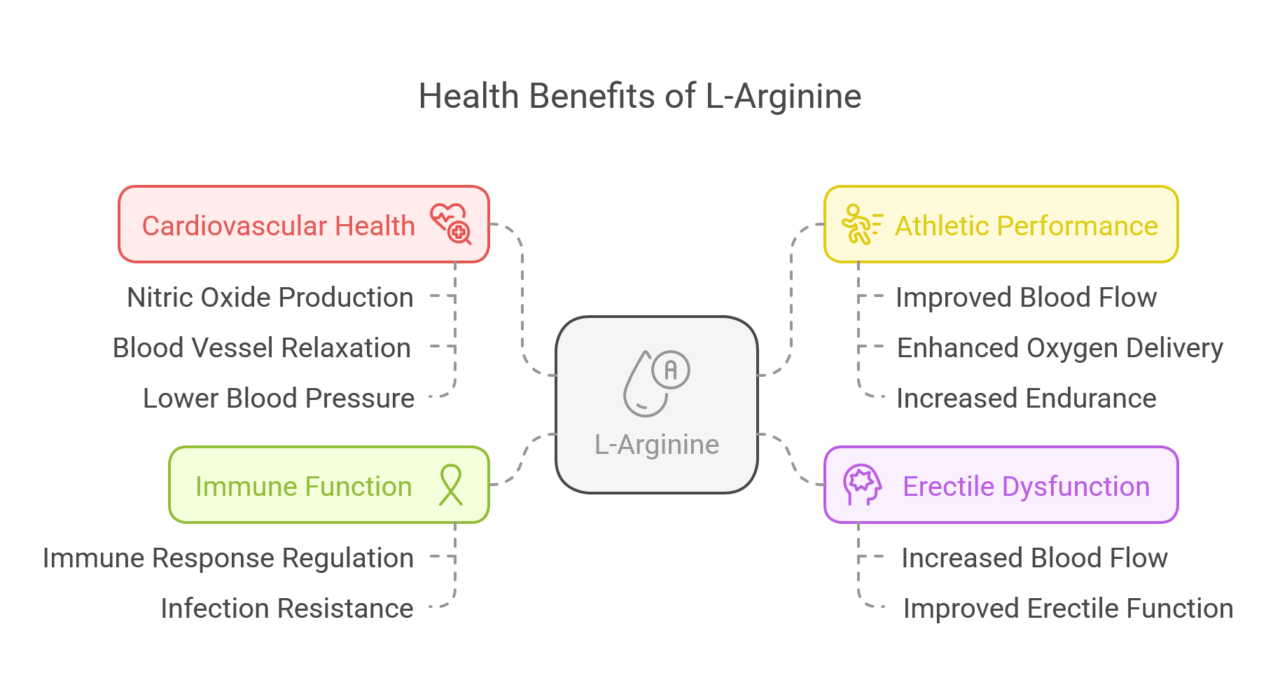
Introduction
L-arginine is an important amino acid that is becoming more popular because of its health benefits, particularly in treating peripheral arterial disease (PAD). In the body, it changes into nitric oxide, which helps widen blood vessels. This widening effect on blood vessels makes L-arginine special. It could help with blood pressure and support better cardiovascular health.
What is L-Arginine?
L-arginine is a semi-essential amino acid. This means that the body can make it by itself, but sometimes we need to get it from food to meet our body’s needs. It is an important part of proteins. L-arginine helps with many processes in the body, like cell division, wound healing, getting rid of ammonia, and supporting immune function. It can become nitric oxide, which is crucial for the production of nitric oxide and is good for heart health.
Besides helping in nitric oxide production, L-arginine also helps make and release hormones. This shows how important it is for keeping us healthy and feeling good.
Definition and Overview
L-arginine is a type of amino acid that our bodies consider semi-essential. This means that while we can make it, there are times when we need more than what we can produce on our own. That’s why it’s important to get L-arginine from our diet or supplements.
One of the important jobs of L-arginine is to help with the urea cycle. This process helps our bodies get rid of harmful ammonia. L-arginine is needed for this cycle to work well and helps ensure our bodies can remove waste.
In addition, L-arginine acts as a starting point for nitric oxide. This is a signaling molecule that helps widen blood vessels. By doing this, it helps control blood flow and blood pressure. The process of making nitric oxide is important for keeping our heart and blood vessels healthy.
Chemical Structure and Biological Role
L-arginine is an amino acid. It has a simple structure like all other amino acids. This structure includes a central carbon atom connected to an amino group, a carboxyl group, a hydrogen atom, and a unique side chain. This side chain is what makes L-arginine different from the other amino acids and gives it special properties.
L-arginine has many important jobs in the body. One of its key roles is to change into nitric oxide. This is very important for the health of blood vessels. Nitric oxide helps to relax and widen blood vessels. When blood vessels widen, it improves blood flow and helps keep blood pressure at a healthy level.
L-arginine is also important for wound healing, hormone release, and immune function. All these roles show how essential L-arginine is for good health and well-being.
Health Benefits of L-Arginine

L-arginine is found in many foods. Taking it as a nutritional supplement has become popular because it may provide health benefits. Research shows that getting enough L-arginine can help improve heart health and manage blood pressure.
Besides benefiting the heart, L-arginine is also being studied for treating erectile dysfunction and conditions like heart failure. It may enhance exercise performance and support the immune system. There are also signs it could help with issues like diabetes and kidney health.
Cardiovascular Health (Enhancing Heart Health)
L-Arginine is important for heart health. It helps make nitric oxide, which relaxes and widens blood vessels. This leads to better blood flow and can lower blood pressure. This amino acid might improve heart health by helping the lining of blood vessels, reducing oxidative stress, and alleviating symptoms like chest pain. Studies suggest it can support heart function and lower the risk of heart disease. Adding L-Arginine to your daily routine may help keep your cardiovascular system healthy.
Erectile Dysfunction and Sexual Health
One of the more popular benefits of L-arginine is its help with erectile dysfunction (ED). Like it does in the heart, L-arginine helps blood flow to the penis. It does this by increasing nitric oxide production.
Erections happen when blood vessels in the penis open up. This allows more blood to flow into the area. Nitric oxide, which L-arginine helps to produce, plays a big part in this. So, having the right levels of L-arginine is believed to help maintain healthy erectile function.
However, while some studies show a link between L-arginine and better ED symptoms, we still need more research to be sure of these results.
Athletic Performance & Exercise (Boosting Exercise Performance)
L-Arginine is popular for improving athletic performance and exercise results, particularly in enhancing skeletal muscle outcomes. It helps the body make nitric oxide, which opens up blood vessels. This ability improves blood flow and oxygen delivery to muscles when you exercise. Better blood flow can lead to more endurance, better efficiency during workouts, and higher overall performance. Many athletes use arginine supplementation to make the most of their workouts and reach their best results.
Immune Function (Supporting Immune Function)
Arginine is very important for keeping our immune system strong. It helps in making nitric oxide, which is a type of fatty acids. This gas plays a part in controlling how our immune system responds. Research shows that taking arginine supplements could boost how well the immune system works and improve overall immune health. By supporting the immune cells, arginine helps us fight off infections and diseases better. Because of its role in immune function, arginine is a key part of staying healthy and keeping our immune system balanced.
Additional Health Benefits of L-Arginine
L-arginine is well-known for its benefits for heart health, sexual health, and boosting the immune system. New research shows that it may have even more health benefits, including helping to control blood sugar levels and possibly having effects on aging, supporting kidney health, and reducing high blood pressure.
It is important to remember that many studies on this are just starting. More research is needed to prove these potential benefits and to know what long-term use of L-arginine can mean for our health, particularly in relation to Helicobacter pylori infection.
Diabetes and Blood Sugar Regulation
Some studies show that L-arginine may help manage blood sugar levels, especially for people with type 2 diabetes. L-arginine can improve how the body uses insulin. This means it could help control blood sugar better.
However, it’s important to remember that these results are not a reason to stop taking your prescribed diabetes medications. L-arginine should not replace your regular meds.
Always talk to a healthcare professional before changing your diabetes management plan. This includes adding supplements like L-arginine.
Emerging Benefits (Anti-Aging, Cognitive Health, Kidney Support)
L-Arginine is showing new benefits for anti-aging, brain health, and kidney support. Research suggests it can help with overall wellness beyond its usual purposes. It might assist with problems related to aging, boost brain function, and keep kidneys healthy. Adding L-Arginine to daily health routines may support a complete approach to health by focusing on these new advantages. Using this amino acid highlights its promising role in improving different areas of health.
Dietary Sources of L-Arginine

Getting L-arginine from a well-rounded diet is usually enough for most people. Many protein-rich foods provide a good amount of this important amino acid, making it simple to add to a healthy eating plan.
By including different foods in your meals, you can make sure you are getting enough L-arginine to help with its various functions in the body.
Top Animal-Based Sources
Animal products are great sources of L-arginine, which is an important amino acid. Here are some good options:
- Red meat: Beef, lamb, and pork have a lot of L-arginine.
- Poultry: Chicken and turkey are also good, especially the darker parts.
- Seafood: Salmon, tuna, and other fish offer a healthy amount of L-arginine.
- Dairy products: Milk, yogurt, and cheese have some L-arginine, but they have less than meat.
Adding these animal-based food sources to your meals can help you get the L-arginine your body needs.
Plant-Based Sources for Vegans
Plant-based sources may not have as much L-arginine as animal products. But there are good options for vegans and those who eat more plants:
- Legumes: Lentils, chickpeas, and beans provide a good amount of L-arginine.
- Nuts and seeds: Pumpkin seeds, sesame seeds, and peanuts help with L-arginine intake.
- Whole grains: Oats, quinoa, and brown rice have some L-arginine too.
By adding these foods to their meals, vegans usually get enough L-arginine. Still, it might help to talk with a healthcare professional about a dietary supplement if needed to make sure they are getting enough.
Table: Comparison of Top Animal-Based and Plant-Based Sources of L-Arginine
| Category | Food Group | Examples | L-Arginine Content (Est.) | Notes |
|---|---|---|---|---|
| Animal-Based | Red Meat | Beef, Lamb, Pork | High (~1.0–1.2g/100g) | Rich source; also provides iron & B12 |
| Poultry | Chicken, Turkey (dark meat preferred) | Moderate-High (~1.4–1.9g) | Lean protein; accessible | |
| Seafood | Salmon, Tuna, other fatty fish | Moderate (~1.0–1.7g) | Also rich in omega-3s | |
| Dairy | Milk, Yogurt, Cheese | Low (~0.1–0.3g) | Less L-Arginine; good for calcium intake | |
| Plant-Based | Legumes | Lentils, Chickpeas, Beans | Moderate (~1.0–1.3g) | High in fiber, protein-rich |
| Nuts & Seeds | Pumpkin Seeds, Peanuts, Sesame Seeds | High (~2.5–3.0g) | Great L-Arginine boost for vegans | |
| Whole Grains | Oats, Quinoa, Brown Rice | Low-Moderate (~0.5–0.8g) | Also provides complex carbs and fiber |
L-Arginine Supplements and Forms
L-arginine is easy to find as a dietary supplement. It helps people who may not get enough of it from their diet. These supplements are available in different forms, so you can choose one that fits your needs and likes.
Like all supplements, you should talk to your doctor or a registered dietitian before starting L-arginine. This is especially important if you have health problems or take other medications.
Types and Forms of L-Arginine Supplements
The market has many types of L-arginine supplements to meet different needs:
- L-arginine capsules or tablets: These are the most popular and easy-to-use forms. They give pre-measured doses for convenience.
- L-arginine powder: This form allows for flexible dosages. It mixes easily into drinks or smoothies.
- L-arginine liquid: This option gets absorbed quickly. It may be a better choice for people who find it hard to swallow pills.
- L-arginine complexes: These combine L-arginine with other helpful nutrients like L-citrulline or antioxidants to boost effects.
Talking to a healthcare professional or registered dietitian can help you find the right type and dosage of L-arginine supplement for your health condition and personal needs.
Table: Types and Forms of L-Arginine Supplements
| Supplement Form | Description | Key Benefits | Best For |
|---|---|---|---|
| Capsules/Tablets | Pre-measured, solid pills for easy daily use | Convenient, travel-friendly | Beginners, regular supplement users |
| Powder | Loose powder that mixes with liquids | Flexible dosing, easy to add to shakes | Fitness users, those needing higher doses |
| Liquid | Pre-dissolved solution for oral use | Fast absorption, easy to consume | People with pill fatigue or absorption issues |
| L-Arginine Complexes | Blends with other compounds (e.g. L-citrulline, antioxidants) | Enhanced performance, synergistic effects | Athletes, advanced users, performance seekers |
L-Arginine vs. L-Citrulline: Which is Better?
L-arginine and L-citrulline both help make nitric oxide, but they work in different ways inside the body. This leads to a question about which one is better for supplements.
When you take L-arginine, it breaks down in the gut. Only some of it gets into the bloodstream for nitric oxide production. In contrast, L-citrulline is absorbed fast and turns into L-arginine in the kidneys. This can lead to a longer-lasting boost in nitric oxide levels.
In the end, the best choice depends on what you need and want. If you want a quick and more significant increase in nitric oxide, L-arginine may be the way to go. However, if you want to keep L-arginine levels high for a longer time, L-citrulline might work better.
Table: L-Arginine vs. L-Citrulline
| Feature | L-Arginine | L-Citrulline |
|---|---|---|
| Role in Body | Direct precursor to nitric oxide | Converts to L-arginine in kidneys to make nitric oxide |
| Absorption Efficiency | Lower – partially broken down in the digestive system | Higher – absorbed efficiently and converted internally |
| Speed of Effect | Faster initial effect | Slower onset, but longer-lasting |
| Duration of Effect | Short-lived | Sustained nitric oxide production |
| Ideal Use Case | Quick nitric oxide boost | Long-term nitric oxide support |
| Common Use | Pre-workout, heart health support | Endurance, performance, muscle recovery |
| Supplement Form | Capsules, powders, liquids | Mostly powders (often as Citrulline Malate) |
| Tolerance | May cause stomach discomfort in high doses | Generally well tolerated |
| Overall Effectiveness | Good for short-term boosts | Better for sustained benefits |
| Best For | Immediate results, short workouts | Endurance athletes, long-lasting circulation support |
How to Choose a High-Quality L-Arginine Supplement
Choosing dietary supplements can be a lot to handle because there are many brands and types out there. To pick a good L-arginine supplement, keep these things in mind:
- Third-party testing: Find supplements tested by independent groups like NSF International or USP. This checks the product’s quality and purity.
- Dosage and form: Pick a supplement that has clear dosing instructions and comes in a form you like.
- Reputable brand: Choose brands known for their quality and honesty about how they make their products.
Don’t forget, the FDA does not check dietary supplements like they do with medications. So, it’s important to research and select supplements from reliable sources.
Recommended Dosage of L-Arginine

The recommended amount of L-arginine you should take can change a lot. This depends on your health, why you are taking it, and the type of L-arginine you have. It’s important to stick to the instructions on the label or what your healthcare provider says.
Starting with a small dose and slowly increasing it can help you see how your body reacts. It’s always a good idea to talk to a healthcare provider to find out what the best dose is for you.
Standard Daily Dosage
A standard daily amount for L-arginine for good health has not been set. However, healthy people usually get about 3 to 6 grams each day from their food.
If you are thinking about taking L-arginine supplements, talk to a healthcare professional first. They can help you find the right dose. In clinical trials, dosages have varied from 500 mg to 30 grams a day. This shows that personal advice is important.
Keep in mind that taking more isn’t always better when it comes to supplements. High doses of L-arginine can lead to side effects and may interact with some medications.
Dosage for Cardiovascular Conditions
L-arginine may help improve heart health. It can support blood pressure regulation and endothelial function. Clinical trials have tested different dosages for these benefits.
Some studies show that taking 3-6 grams a day could help with heart health and managing blood pressure. However, you should not treat cardiovascular issues with L-arginine on your own.
Always talk to a healthcare professional. They can give you the right diagnosis, treatment, and advice on how much L-arginine to take. They will look at your health history, risk factors, and any possible interactions with other medicines before suggesting any supplements.
Dosage for Erectile Dysfunction
L-arginine is popular for possibly helping with erectile dysfunction (ED) because it may improve blood flow. Studies on L-arginine for ED have used different amounts.
Clinical trials have tested doses from 1.5 to 5 grams every day, often alongside other supplements or medications. Still, it’s key to note that research on using L-arginine alone for ED is not clear.
If you are thinking about using L-arginine for ED, it is important to talk with a healthcare professional. They can help you understand your symptoms and look into all your treatment options.
Dosage for Physical Performance
Athletes and people wanting to improve exercise performance often use supplements like L-arginine. They believe it may help increase blood flow and deliver nutrients to muscles. But, research on how well it works is mixed.
Some studies looked at different amounts of L-arginine, usually between 3 to 6 grams daily taken before workouts.
Although L-arginine might help boost athletic performance a little for some, it is not a cure-all. Other important factors, such as proper training, enough rest, and a good diet, are key to getting the best physical performance.
Risks and Side Effects
L-arginine is mostly safe for short-term use if taken in recommended amounts. However, like any supplement, it may cause side effects in some people. We also don’t fully understand how it affects health in the long run.
It’s important to be careful with L-arginine supplementation, especially if you have health issues such as guanidinoacetate methyltransferase deficiency or take medications. Be sure to talk to a healthcare professional to hear about the possible benefits and risks.
Common Side Effects
L-arginine supplementation is usually safe. However, it can cause mild side effects for some people. These side effects often go away on their own and usually are not serious.
Common side effects of taking L-arginine include stomach issues like bloating, diarrhea, and nausea. These problems can depend on the dose. You can reduce these effects by starting with a lower dose and slowly increasing it as your body adjusts.
If you have ongoing or strong side effects after using L-arginine, stop taking it. It’s a good idea to talk to a healthcare professional to check for any health condition or possible problems with medications you are taking.
Who Should Avoid L-Arginine?
L-arginine is usually safe to use for a short time. However, some people need to be careful or completely avoid it because of possible risks and interactions.
Individuals with specific health problems, such as low blood pressure, kidney disease, or a history of heart attack, should talk to their doctor before using L-arginine.
Also, people who take prescription drugs, especially for blood pressure, erectile dysfunction, or blood thinning, should not use L-arginine without first checking with their healthcare provider. Interactions might happen.
When to Seek Medical Advice
If you are thinking about adding L-arginine supplements to your health routine, talking to your healthcare provider is a wise first step. They can look at your health, check for any existing conditions or medications, and help you understand the risks and benefits.
Pay attention to how your body reacts to L-arginine. If you notice any strange or ongoing side effects, stop using it and talk to your healthcare provider right away. Early action can help stop small problems from getting worse.
Always keep open communication with your healthcare provider. This is important for safely exploring supplements and making smart choices about your health.
Precautions and Contraindications
While L-arginine is often said to have health benefits, you should be careful when using it. Like any supplement, there are some warnings and situations where you might need to avoid it.
People with low blood pressure should watch out, as L-arginine can lower blood pressure even more. Those who have kidney or liver disease should speak with their healthcare provider before starting L-arginine, as it may worsen their condition. Pregnant or breastfeeding women should stay away from L-arginine too, since there is not enough safety information for them.
Drug Interactions and Warnings

L-arginine is usually safe for most people when taken in moderate amounts. However, it can interact with some medications and might cause negative effects. It is important to know about these interactions to avoid complications.
Always talk to your healthcare provider or a pharmacist about how L-arginine may affect your current medications. This includes any over-the-counter drugs and herbal supplements you may be using.
Interaction with Prescription Medications
L-arginine can interact with different prescription medicines. This often happens because it can lower blood pressure or help with nitric oxide production. Not considering these interactions may result in unwanted or harmful effects.
For example, if you take L-arginine and nitrates together, which are usually given for heart issues like angina, it could cause a big drop in blood pressure. This might make you feel dizzy, faint, or cause other problems.
So, it is very important to tell your healthcare provider about all the medicines and supplements you take before you start L-arginine. They can check for risks, change your doses, or suggest other options if needed.
Interaction with Other Supplements
L-arginine can mix with other supplements. This may change how they work or cause some unexpected side effects. Some of these interactions might not be harmful. However, they can reduce the health benefits you expect or create imbalances in your body.
For instance, if you take L-arginine with other supplements that lower blood pressure, like fish oil, CoQ10, or magnesium, it could lower your blood pressure too much. This might make you feel dizzy or lightheaded.
It’s important to be open with your healthcare provider about all the supplements you are using. This helps prevent possible drug interactions. It also helps you make sure you are safely getting the most from your health regimen.
Table: L-Arginine – Interactions with Other Supplements
| Supplement | Interaction with L-Arginine | Possible Effects | Precaution/Advice |
|---|---|---|---|
| Fish Oil (Omega-3s) | Both may lower blood pressure | Risk of low BP, dizziness, fatigue | Monitor blood pressure; adjust dosage if needed |
| CoQ10 | Enhances nitric oxide, also lowers blood pressure | May cause additive drop in BP | Use under supervision if taking BP meds |
| Magnesium | Relaxes blood vessels and muscles | Can amplify vasodilation and drop BP | Be cautious of dizziness or weakness |
| L-Citrulline | Boosts arginine levels and nitric oxide production | Synergistic effect, increased endurance | Generally safe and beneficial |
| Vitamins (C, B6, B12) | Support nitric oxide production and energy levels | Improves effectiveness of L-Arginine | Safe combo; usually no negative interaction |
| Pre-workouts (with stimulants) | Can raise heart rate while arginine lowers BP | May create imbalances (BP vs HR) | Monitor for jitteriness or irregular heartbeat |
| Nitrates or Nitroglycerin (meds) | Strong interaction with nitric oxide boosters | Dangerous drop in blood pressure | Avoid combination unless prescribed |
Special Considerations for Various Health Conditions
Managing health conditions often requires a tailored approach, and using supplements like L-arginine is no exception. Here are special considerations for individuals with specific health concerns:
| Health Condition | Special Considerations with L-Arginine |
|---|---|
| Heart Disease | Consult a doctor before use, as L-arginine can lower blood pressure and interact with heart medications. |
| Diabetes | Monitor blood sugar closely as L-arginine might lower blood sugar levels and interact with diabetes medications. |
| Kidney Disease | Use with caution, as high doses of L-arginine might worsen kidney function. |
| Low Blood Pressure | Avoid L-arginine, as it can further lower blood pressure. |
This table is not exhaustive, and open communication with your healthcare provider about your specific condition is essential before starting L-arginine or any new supplement regimen.
Practical Guide to Using L-Arginine
If you are thinking about using L-arginine in your health routine, it is important to know how to use it safely and effectively. Always talk to your healthcare provider for specialized advice before adding any new supplement, like L-arginine.
Keep in mind that supplements are not a fast solution. They can help as part of a complete health plan that also includes a balanced diet, regular exercise, stress management, and good sleep.
How to Take L-Arginine Safely and Effectively
When you want to take L-arginine safely and effectively, these guidelines can help:
Consult your healthcare provider: Before starting L-arginine or any new supplement, talk to your doctor. They can help you decide if it’s right for you and find a safe dose based on your health and medical history.
Start with a low dose: It’s best to begin with a smaller dose of L-arginine. You can then slowly increase it if needed and if your body can handle it. This way, your body can adjust better, and it can reduce the chance of side effects.
Take L-arginine on an empty stomach: For the best results, take L-arginine at least 30-60 minutes before meals or 2 hours after eating. This timing can help your body absorb the supplement better, so you get more benefits.
Best Combinations with Other Supplements (L-Citrulline, Vitamins)
L-Arginine works really well with L-Citrulline and vitamins to improve its effects. L-Citrulline helps increase nitric oxide levels, which supports arginine’s benefits for blood flow and better exercise performance. Vitamins, especially Vitamin C, help in making nitric oxide, which boosts overall heart health along with L-Arginine. This mix provides a great way to enjoy all the health benefits linked to arginine supplementation.
Table: Best Supplement Combinations with L-Arginine
| Supplement Combo | Role/Function | Key Benefits | Best For |
|---|---|---|---|
| L-Arginine + L-Citrulline | Enhances and sustains nitric oxide production | Improved blood flow, stamina, and longer-lasting effects | Athletes, pre-workout users |
| L-Arginine + Vitamin C | Supports nitric oxide synthesis | Better heart health, antioxidant support | Cardiovascular health, immune support |
| L-Arginine + Vitamin B6/B12 | Helps with amino acid metabolism and energy | Increased energy, improved circulation | General wellness, energy and metabolism |
| L-Arginine + Magnesium | Supports muscle function and vascular tone | Better muscle recovery, reduced cramps | Muscle performance, post-workout recovery |
| L-Arginine + Antioxidants (e.g. CoQ10) | Protects nitric oxide from oxidative breakdown | Enhanced cardiovascular and cellular health | Older adults, heart health focus |
Conclusion
L-Arginine has many health benefits. It can support your heart and help improve your exercise performance. You can get L-Arginine from both animal and plant foods, and it’s very helpful. If you think about taking L-Arginine supplements, it’s important to make sure they are good quality. You should also talk to a healthcare provider, especially if you have health issues or take medication. You can enjoy the benefits, but be careful with how much you take and how it might interact with other things. When you add L-Arginine to your health routine, do it carefully and with good knowledge. Consider how this amino acid can help you on your health journey. If you have questions, reach out to a healthcare provider for help and advice.
The content on WellwayHub.com is intended for general informational purposes only and should not be taken as medical advice. Please consult your doctor or a qualified health professional before making any changes to your health routine.
Some links on WellwayHub.com may be affiliate links. This means we may earn a small commission if you make a purchase through these links, at no extra cost to you. This helps support our mission to provide trusted wellness content.
Frequently Asked Questions
L-arginine can be taken every day. However, it is important to talk to your healthcare provider first. They can help you with the right dose and tell you about the health benefits and risks that fit your personal situation.
The long-term safety of arginine supplementation is not completely known. It’s important to talk with your doctor about the possible health benefits and any risks of using it for a long time.
Yes, L-Arginine can have side effects in some people, especially in large amounts. Common side effects are bloating, stomach pain, diarrhea, and low blood pressure. People with specific health problems, like herpes, asthma, or low blood pressure, should talk to a doctor before using it. It’s also important not to mix L-Arginine with some medicines without asking for medical advice.
Yes, L-arginine is naturally present in many food sources. These include red meat, poultry, fish, dairy products, nuts, seeds, and legumes. A well-balanced diet usually gives enough L-arginine for most people.
L-Arginine improves blood flow by increasing nitric oxide, supports heart health, lowers blood pressure, enhances exercise performance, boosts immune response, aids wound healing, and improves erectile function.
L-arginine is a building block for nitric oxide. Nitric oxide helps relax and widen blood vessels. This can improve blood flow and may lower blood pressure. It also supports heart health.
Some studies say that L-arginine may help with weight loss. It might affect metabolism and support muscle growth. However, more research is needed to confirm these health benefits.
Pregnant women should talk to their healthcare provider before using L-arginine. Its safety during pregnancy is not completely known.
Studies about L-arginine and how it affects athletic performance have different outcomes. It may help a little for some people, but more research is needed to confirm how well it works.